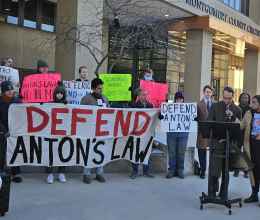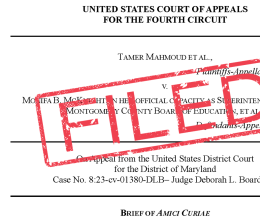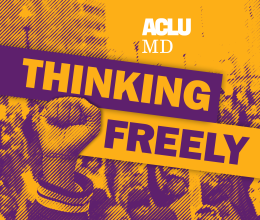
ACLU Opposes Diversion of State Funds to Subsidize Private and Religious Schools Not Required to Meet State Testing and Anti-Discrimination Standards
Contact: Meredith Curtis, 443-310-9946, media@aclu-md.org
ANNAPOLIS: Today, Governor Larry Hogan, who sought to cut millions in public school funding this legislative session, introduced a supplemental budget proposal that includes $5 million in dedicated funding for the problematic "Maryland Education Credit" (MEC) program for private and religious schools, previously known as BOAST (Building Opportunities for All Students and Teachers), an initiative which has been consistently rejected by the General Assembly. The American Civil Liberties Union (ACLU) of Maryland is calling on budget conferees to vote down dedicated funding supporting K-12 private and religious schools in Governor Hogan's supplemental budget.
"Governor Hogan has still not released $68 million in critical public school funding that the legislature worked to restore - but now he wants to siphon millions of taxpayer dollars and give them to businesses to support private and religious schools?" said Susan Goering, executive director for the ACLU of Maryland. "There are absolutely no protections in this money giveaway that ensures that these public dollars are not supporting private schools that discriminate against students with disabilities as well as LGBT teachers and students."
This session, Governor Hogan proposed a budget that would have resulted in millions less for most public schools in Maryland. Thankfully, legislators restored most of those cuts, but the Governor must release the funding for the Geographic Cost of Education Index, $68 million. And as it has for many years, the General Assembly also was poised to reject the "Maryland Education Credit" bill (HB 487), which is fraught with problems:
- If MEC is enacted, millions of dollars will be diverted away from the general fund, which goes to support public school systems statewide and would compromise the public schools' ability to give children an adequate education. Yet it is public schools that embrace all students, no matter who they are.
- The bill does not include provisions requiring the private and religious schools that receive the funds to comply with all state nondiscrimination laws. LGBT students can be refused admittance, LGBT teachers can be fired, and such schools are not required to educate children with disabilities or low-income children.
- Private schools do not have to meet state standards for student performance or achievement. Private schools do not have to administer state high school assessments nor publicly report results from achievement tests, and they will not be required to under the MEC bill.
- Public funding of religious schools further erodes the wall of separation between church and state.
###






